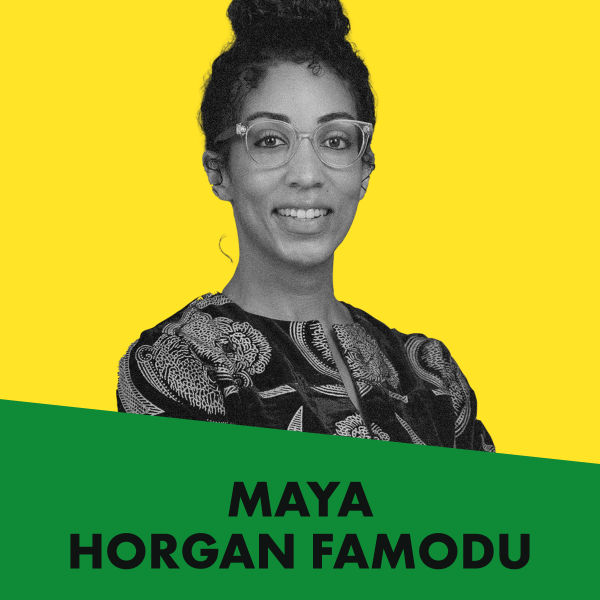Can you teach entrepreneurship?
With guests Bitange Ndemo, Rebecca Enonchong, Thami Pooe

Episode notes
“It takes a certain type of personality to be an entrepreneur.”
Transcript
Can you teach entrepreneurship?
Africans are known for their hustle – and the facts back it up.
According to research by the Tony Elumelu Foundation and Stanford University, Africa has the highest percentage of entrepreneurs among working-age adults of any continent in the world.
But sadly, we’re not all Tony Elumelu or Elon Musk… We asked three gu...
Can you teach entrepreneurship?
Africans are known for their hustle – and the facts back it up.
According to research by the Tony Elumelu Foundation and Stanford University, Africa has the highest percentage of entrepreneurs among working-age adults of any continent in the world.
But sadly, we’re not all Tony Elumelu or Elon Musk… We asked three guests: how can we teach Africans to be better entrepreneurs?
Rebecca Enonchong is a Cameroonian entrepreneur with technology businesses in the US, UK, Canada, as well as many African countries. She’s known on Twitter as @africatechie where she tweets tech insights to her 140 thousand followers.
Professor Bitange Ndemo may teach entrepreneurship at the University of Nairobi but he has some reservations about whether the subject can be taught.
Thami Pooe founded a social enterprise called Tshimong which teaches young South Africans to debate. But he also found that it helps them learn soft skills vital for entrepreneurship.
Did you enjoy the episode? Please let us know what you think here.
Please listen to a previous episode: How can we raise more African unicorns?
Transcript: Can you teach entrepreneurship?
Claude:
Africans are known for their hustle – and the facts back it up.
According to research by the Tony Elumelu Foundation and Stanford University, Africa has the highest percentage of entrepreneurs among working-age adults of any continent in the world.
But sadly, we’re not all Tony Elumelu or Elon Musk… Can we teach Africans to be better entrepreneurs?
Our first guest is Thami Pooe, who actually comes from the world of debating. He founded a social enterprise in Johannesburg, South Africa called Tshimong which teaches young children how to debate. But he found that it helps them learn skills which are applicable to lots of other disciplines, including entrepreneurship. Our producer Dimpho Lekgeu spoke to him.
Dimpho:
Africans are some of the most entrepreneurial people in the world. But that spirit of entrepreneurship usually comes from a place of necessity. So do you think Africans have a culture of entrepreneurship? And if not, then one of the stumbling blocks. Is it a resources problem? Or is it an education problem?
Thami:
Look, just on the education problem, we definitely have an education problem. I think no one goes into at least the basic education system in South Africa with a clear path on how to be an entrepreneur. An entrepreneurial education isn’t necessarily Business School, per se. I don’t even think it’s that at all. It’s some of the extra activities that can be incorporated into an education system that can influence students to start businesses, right, so having a robust extracurricular activity environment, having a robust enterprise environment, you know what I mean, like there are all sorts of like competition based things that I think we can do in the education system that can get us to a place where people can think of themselves as startup founders, but I think deeper than that is the way that the education system is designed.
We teach biology in this specific way, where you have to learn the eight chambers of the heart or four chambers – I’ve even forgot! Right so that you can eventually become a doctor in the end, right, but we don’t teach you how to think innovatively in that life sciences and biology environment so that you can one day be the kind of scientist that can create a pharmaceutical product that could cure cancer.
We don’t create an environment where people can experiment in their learning. We don’t assess experiment. The only way to create entrepreneurs systematically is to really just reshape the way people are taught.
Dimpho:
I think while we’re on the topic of transforming the way that people are taught Can we really teach entrepreneurship? Or is it something that is just inborn? And if we are teaching Africans to be more entrepreneurial, does that mean we need to have more entrepreneurial academics within the education system?
Here’s the thing. The people that provide the most value and thus are the richest in this economy apart from other structural and unfair issues, at its best, these people are the best problem solvers. So what you need to do in a teaching environment is that you need to constantly throw problems at children that they need to solve. Engage in a process of design and thinking, a process of also thinking about the problem and a process of designing a solution, iterating, implementing, failing and trying again, that’s the kind of environment we need.
Claude:
Our second guest is Rebecca Enonchong, a Cameroonian entrepreneur who moved in her teens to the US. She now lives back in Cameroon. She has set up technology businesses in the US, UK, Canada, as well as many African countries. She’s perhaps better known on Twitter as @africatechie where she tweets tech insights to her 140 thousand followers. Here’s our conversation.
I was wondering, from your perspective, do you think entrepreneurship is something taught?
Rebecca:
So I think that you can learn skills, entrepreneurship skills, but I’m not sure that you can really learn entrepreneurship.
It takes a certain type of personality to be an entrepreneur, to be a successful entrepreneur. And I think that, you know, in many cases, governments have gotten very lazy like they’re using entrepreneurship as kind of like a throw away and remove responsibility from themselves to create jobs, and to create an environment where jobs can be created and pretty much tell young people to go entrepreneur themselves out of, you know, out of poverty. And I think that…
Claude:
Sorry to interrupt, so as we are not able to implement public policies that create jobs. Governments say: why don’t you entrepreneurs go and solve our problem, right?
Rebecca:
That’s exactly it. That’s exactly it. And so there’s all these this language around the importance of entrepreneurship, but in most cases, and you know, there are exceptions of course, across the continent, but in so many cases, this is not accompanied by an environment that is supportive of the, that is supportive of the journey of entrepreneurs.
And I say this because, you know, entrepreneurship, whether they’re in the startups, you know, they’re in technology, they’re still an industry, just like any other industry. And so if it’s a difficult business environment for, you know, large corporations, you can just imagine what it might be for an entrepreneur that has, you know, all the same challenges.
As a big sized business with all the additional challenges you have as an entrepreneur. And I’ve often said that to be an entrepreneur, you have to be crazy, but to be an entrepreneur in Africa, you have to be raving mad. Because it is just you know, the challenge is seen so many times so overwhelming and that you know, being able to succeed in that type of environment really does take a certain type of personality. And I think that we make a mistake by thinking that, you know, if you can’t get a job, just be an entrepreneur. It’s just really not that easy
Claude:
What skills do you think we should be teaching these young, aspiring entrepreneurs or budding entrepreneurs?
Rebecca:
Wow, that’s such a great question. I think that you really need to start very, very early, you know, having an educational programme. You know, in Africa many times like the educational programmes are very strict and set in stone and haven’t really changed in many, many years… and so there’s no room for critical thinking. Right? Because critical thinking is actually punished…
In many cases, you’re not supposed to question authority. It’s cultural, but the questioning, the insisting is really what entrepreneurship is all about because you’re seeing a problem and you’re finding a solution that doesn’t exist yet. Right?
And so that takes being able to break the mould you know. It’s so funny because in the US, and in all those places, being disruptive is a positive thing. But when you’re disruptive on the continent, a lot of times you end up in prison.
So it’s really just the mindset of our leaders that needs to change. They must understand that if they really want to improve entrepreneurship and use entrepreneurship as a means for development, that means that the environment within which entrepreneurs work and function must be a much more positive one.
Claude:
Our third guest is Professor Bitange Ndemo. He teaches entrepreneurship at the University of Nairobi. I started off by asking what he teaches his students.
You’re a Professor of Entrepreneurship at the University of Nairobi. What do you actually do?
Bitange:
Well, [laughs] I’m supposed to be teaching there… The government thought that if each student goes through an entrepreneurship course they should be able to be creators of employment in the days to come.
Claude:
But it actually sounds a little bit counterintuitive because, you know, some of the most successful entrepreneurs in Africa and around the world actually, were never taught a single course on entrepreneurship.
Bitange:
Yes, the truth is that nobody can teach you entrepreneurship. What we do in the degree programme is simply to talk about the important skills that they would require and we help them achieve their goals more quickly through either finding internships or through network opportunities. I said this because nobody can teach you hard work. Nobody can teach you creativity, even the drive that comes from inside of you.
Claude:
Even resilience, even resilience in the face of adversity, which every entrepreneur faces.
Bitange:
Yes, that comes from inside you. I think if you remember, there is a quote by I think Benjamin Franklin, which is: tell me and I forget, teach me and I may remember, involve me, and I learn. So what an entrepreneur is supposed to do is like to work with you and they learn something by either mentorship or closely working with you. But this sitting you down and telling you that you must be creative, or you must be innovative in order to survive. That doesn’t make you an entrepreneur.
Claude:
And what kind of skills do you think are actually useful to these kinds of entrepreneurs that you’re training?
Bitange:
What I found to be more important for them to know is that you don’t just succeed, you don’t just get into entrepreneurship and succeed. So what I normally try to emphasise is that take risks, be innovative, and also be proactive. And then you also explain to them about the sources of opportunity, because if you want to succeed in entrepreneurship, you have to exploit an opportunity. And these opportunities come from a couple of areas, the most important ones are problems. And I normally say Africa is blessed with so many problems that if you solve any one of them is a success in entrepreneurship.
Claude:
Well, I have to say that very few of the entrepreneurs that I’ve worked with, in my multiple initiatives on entrepreneurship in my home country, Togo and elsewhere in Africa, are actually problem solvers. What do I mean by that? My dad always used to say there’s no problems, there’s only solutions. And what I found was that a lot of the young entrepreneurs that I work with, they lack what I would call personal initiative.
Bitange:
Actually, to be very honest, Africa, we have a lot to do in order to get our entrepreneurs to be very successful, even though we have some who have succeeded, but we need more to succeed. The way we were brought up, the way we have been been brought up over the years, Africans were largely dependent, dependent. I usually say the moment we stop aid from the Western world, that is when Africa will develop. That is when African entrepreneurs will begin to see opportunity.
Claude:
We’re not looking for simple answers on this podcast. We believe Africa’s potential is limitless, and so are the entrepreneurial opportunities.
It is hard to teach someone how to develop a more entrepreneurial mindset.. But I do think it is possible to help them develop skills like problem solving and to encourage traits like resilience.
I want to end on that Benjamin Franklin quotation that Professor Ndemo mentioned. He was one of America’s founding fathers. I think it sums up the attitude of all our guests to teaching entrepreneurship: “Tell me and I forget, teach me and I may remember, involve me and I learn.”
Please listen to a previous episode: How can we raise more African unicorns?
Listen next
"It wasn't just an overnight thing. Seeds were planted."
With guests: Maya Horgan Famodu
LISTEN NOW 55 min
How did I make my first million?
With guests: Maya Horgan Famodu, Moulaye Taboure, Moutagna Keita
LISTEN NOW 15 min








